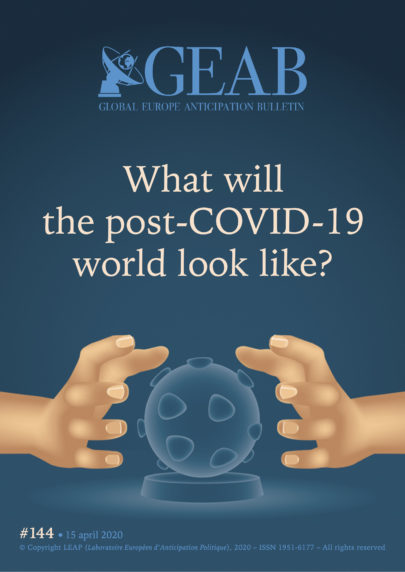GEAB 144

Many people will see their dreams of radical change disappointed. Yet there will certainly be change!
You don’t need to be an eminent guru to understand that the 8 trillion dollars to be injected into the world economy that the G20 leaders have announced,[1] in addition to the 250 trillion dollars of world debt accumulated at the end of 2019,[2] require a paradigm change in the financial and monetary sectors. Indeed who can imagine that this “money” will ever be paid back? Who could still have ‘faith’ in a system where money, even though it is king, can appear at the stroke of a magic wand? Worse than naked, this king is no more than a conjuror’s illusion.
Moreover, as we have said: debt is nothing but the money that the multipolar global economy needs for its development. The problem is that the fallacy of the old money-making predicates – essentially designed to maintain a caste of wealthy people exploiting a caste of workers/consumers – have been caught in the act: the old ‘monetary demiurges’ are no longer credible.
For example, Europe has just ‘unblocked’, ‘created’ or ‘invented’ 15 billion euros for Africa[3]. But where does this money come from? And, if it is manufactured, why wouldn’t the Africans make it themselves? To wonder how the $250 trillion of debt will be serviced under the current paradigm (Inflation? Infinite postponement of repayment terms? Cancellation? War?) is a waste of time that the subsidised media can afford, but not the GEAB.
2020: 5G and digital currencies
So, let’s turn our attention to this digital revolution and its penultimate stage of societal transformation: money (the last concerns human beings). Certainly, you haven’t forgotten that 2020, before becoming the Coronavirus year, was the year of the central banks’ digital currencies (CBDCs) and of 5G, the two being linked and heralding a definitive end to the dollar-centric monetary system? [4]
The pandemic is having two contradictory effects on this transformation:
- a relative[5] slowdown in the deployment of 5G[6]
- an accelerator effect, particularly on the urgent need to move out of the current monetary system[7]
Africa and the cryptocurrencies
To gauge the accelerating effect of the shift in the monetary paradigm, let’s turn our attention to Africa.
Africa is forecast to be particularly threatened by the effects of the crisis.[8] But, as we have said before, the Africa of the 21st century is much stronger than that of the 20th century. For now, it even seems to be less affected, maybe because it is undoubtedly younger and more resilient (basically because ‘it doesn’t make that much difference’).
So, we were wondering where this continent’s monetary thinking now was and what we found is very interesting. The African Union signed a 3-year agreement with Huawei last May to develop 5G[9] but, since then, we haven’t found much. As for ECOWAS, it only talks about the Eco (the project to replace the CFA Franc that we have often talked about[10]) to vilify France[11] or to argue with English-speaking Africa.[12] That said, the Eco solution, if it is a sign of the times, is perhaps not really the solution to the monetary problem of the continent. The Africans are young and looking towards the future. For example, the black market of foreign currencies which, following previous experience, should have exploded in favour of the dollar or the euro in the context of the current crisis, is actually collapsing.[13]
One of the reasons is the fear of virus transmission via this physical currency. But the other reason is that there are other solutions today. And indeed, the cryptocurrency market appears to be overheating![14]
If this activity of exchanging cryptocurrency automatically increases its value, the Africans will get through the crisis better this way than by waiting for international aid, intermediated by their governments, to arrive in their pockets… probably only to depreciate there immediately.
Back in 2018, the UN identified Africa as the ideal continent to develop cryptocurrency solutions[15]… apparently this recommendation has been followed up. It allows the continent to project itself into a bright future of digital economy[16] even if no common currency is yet in sight. Africa’s multicurrency-based digital economy model may end up being the most modern of all!
The Africans are seizing a great opportunity: due to the rejection by the Americans, in particular (and Europeans as a result), of innovative monetary solutions that jeopardize the domination of the dollar, the monetary-geeks of Silicon Valley and elsewhere went to sell their services to Africans. Thus, a company like Apollo Fintech (American in origin, but mainly Slavic) is currently working with Zimbabwe[17] and Lesotho[18] to set up their digital currencies (backed by gold in the case of Zimbabwe). Although not many African states have yet taken a position on this development, the fact remains that, to the indifference of the media, it was Tunisia that last November brought out the world’s first CBDC[19] – before China!
Cryptocurrencies and CBDCs seem to be opposed and the fact is that, each time a nation adopts a CBDC, it will regulate cryptos in the process. But for the time being, cryptos are seen as a step towards preparing people for the widespread roll out of institutional digital money.
Login

Political anticipation is LEAP’s method of “rationalisation of the future”. In fact, it is very close to the “historical method” in the sense that it is accessible to all and [...]
Since 2008, the GEAB has been talking about the ‘world after’. Now everyone is using this expression. It is therefore time to archive the ‘global systemic crisis of 2008-2020’. The [...]
“In 2020, a global pandemic called COVID-19 brought the world economy to a virtual standstill for several months. To contain the epidemic, governments had to take radical measures to contain [...]
While the need for the digitalisation of the international monetary system described earlier is being reinforced by the financial crisis triggered by the pandemic, one finds in many articles on [...]
For the past few weeks, the planet has been in a state of emergency; people are locked into their homes and the economy is in a state of hibernation. As [...]
Is the US oil industry undergoing a significant shift in its relationship with its government, now accepting levels of influence or direct control that would have been unthinkable only a [...]
Businesses - Don't expect a normal recovery in September! A growing proportion of economic and service players are aware of this, but it is worth hammering home the fact that [...]

Comments